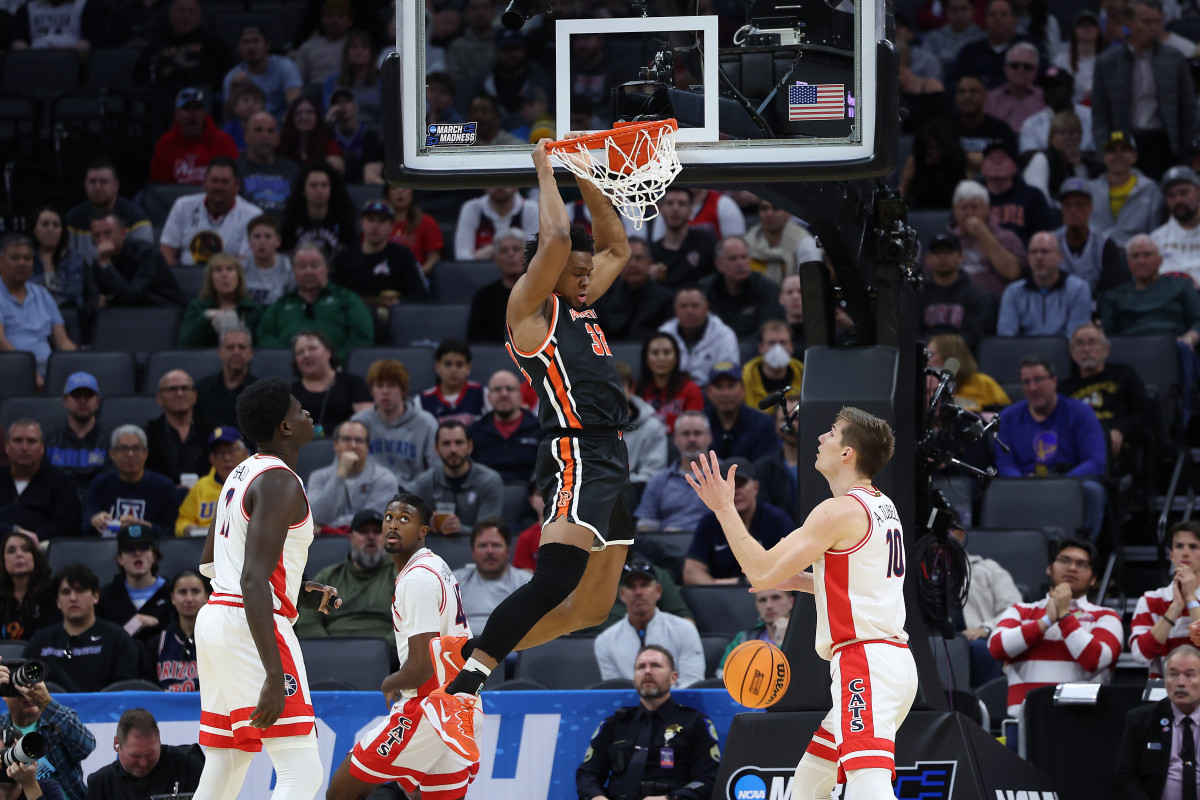Princeton Is the New Cinderella No. 15 Seed on the Block

For a second straight year, a No. 15 seed from New Jersey has upended the men’s NCAA tournament bracket.
Last year, it was Saint Peter’s, the small commuter school in Jersey City that electrified the sports world on its run to the Elite Eight. This time around, it’s Princeton, one of the world’s most prestigious universities, providing the first true tournament shocker. The Tigers trailed Arizona for the game’s first 37 minutes, but rallied from a double-digit second-half deficit to win 59–55 and become the third No. 15 team in as many years to win at least one game.
This wasn’t the traditional upset: Princeton shot a worse percentage from the field, shot just 4–25 from three, and its top two guards combined to shoot just 5–25 in the game. Instead, the Tigers outrebounded an Arizona team with one of the nation’s most vaunted frontcourts and generally frustrated an explosive offensive team. Princeton also seemed to get stronger as the game went on, holding Arizona to just four points in the game’s final eight minutes and none in the final 4:45. When faced with game pressure, the Wildcats folded, committing three turnovers in that defining 4:45 and settling for perimeter jumpers when they did get shots up.
Princeton was as big a transfer portal victim as any last spring, to no fault of their own. The Ivy League’s archaic rule prohibiting athletes to play more than four years, combined with the league sitting out the COVID-impacted 2020-21 season, has essentially forced all Ivy athletes to spend their final year of eligibility elsewhere. That sent point guard Jaelin Llewellyn (Michigan), wings Ethan Wright (Colorado) and Drew Friberg (Belmont), and bench guard Max Johns (Duke) out of town from an Ivy-winning ‘22 team. And the portal isn’t a two-way street for programs like Princeton—taking an incoming transfer is rarely possible due to stringent academic requirements. The Tigers were forced instead to rely on internal improvement and youth, and it worked: They got major contributions today from youngsters Blake Peters (9 points, 3–5 from three) and Caden Pierce (6 points, 8 rebounds).

Contrast that with Arizona, which responded quickly with transfer adds after losing guards Dalen Terry and Bennedict Mathurin to the NBA in the spring, bringing in Courtney Ramey (Texas) and Cedric Henderson (Campbell). That starting duo went 2–11 and combined for five points against Princeton. Arizona’s reload produced 28 wins and a Pac-12 title, but won’t be remembered for anything other than its March collapse.
It’s the latest of the increasingly-common 15-over-2 upset that has blown up brackets in three straight years. No. 15 seeds have advanced just 11 times in tournament history, but have now done so in three straight years and seven times in the last 12 years. Per Heat Check CBB, No. 15 seeds had nine total wins in the NCAA tournament from 1985 to 2019 and now have six in the last three tournaments.
Until today, the Princeton program’s signature modern-era win was against another Pac-12 school: UCLA in 1996. Pete Carril, the architect of the offense now named after the school and copied by coaches at every level, was coaching the Tigers then. Less than a year after Carril’s passing, Princeton is the talk of the basketball world again. And the coach leading the way? Mitch Henderson, a starter on that 1996 team. A poetic new Cinderella No. 15 seed is on the block, and given recent history, they might just be getting started.
